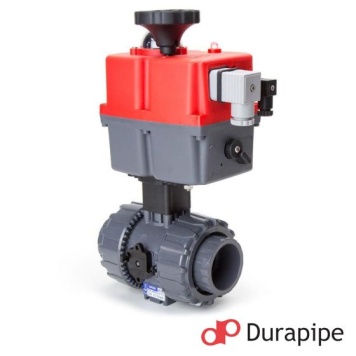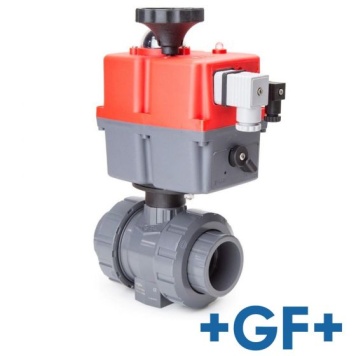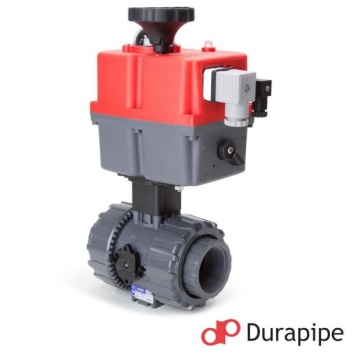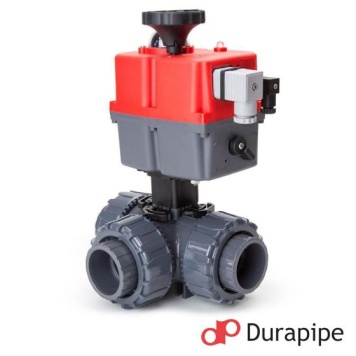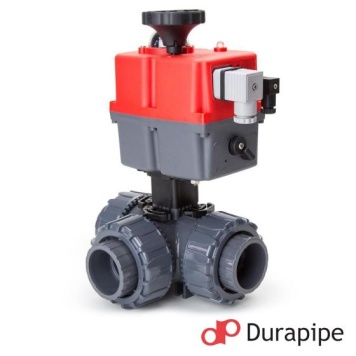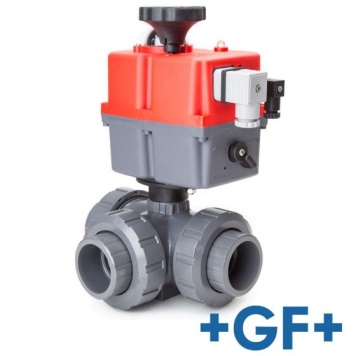Login / Register
- Home
- Actuated Valves
- Electric Actuated Valves
- Electric Actuated Ball Valves
- Electric Actuated PVC Inch Ball Valves
Electric Actuated PVC Inch Ball Valves
At Pipestock, we offer a diverse range of electric actuated PVC inch (imperial) ball valves, including T-port, L-port, and plain configurations, manufactured by Georg Fischer and Durapipe. These valves are ideal for various applications that require reliable, non-corrosive, and lightweight valve solutions. All our PVC ball valves are fitted with the advanced J+J J4C-S electric actuator, ensuring precise control and automation for efficient fluid management in diverse industries.
Why Use an Electric Actuator on a PVC Ball Valve?
Using an electric actuator on a PVC ball valve provides automated, remote-controlled operation, making it highly efficient for managing fluid flow in complex systems. Electric actuators eliminate the need for manual intervention, enabling precise valve positioning and reducing the likelihood of human error. This is especially important for systems that require frequent or rapid changes in flow, ensuring optimal performance and efficiency. Additionally, the J+J J4C-S actuator offers features like multi-voltage capabilities, visual operation control, and electronic torque limiting, enhancing operational reliability and safety.
What Applications Use Electric Actuated PVC Ball Valves?
Electric actuated PVC ball valves are used across a wide range of industries due to their versatility and resistance to corrosion. Common applications include:
- Water Treatment: Perfect for controlling water flow in treatment plants, thanks to PVC's resistance to both chemicals and corrosion.
- Chemical Processing: PVC ball valves are used for handling mild chemicals and corrosive liquids, providing reliable and durable performance.
- Irrigation Systems: Used in agricultural and horticultural settings, electric actuated PVC valves ensure precise control of water distribution.
- Food and Beverage: Due to their non-toxic properties, PVC valves are suitable for certain food-grade applications that involve non-aggressive liquids.
Advantages of Using PVC Ball Valves
- Corrosion Resistance: PVC (Polyvinyl Chloride) offers excellent resistance to corrosion, making these valves ideal for environments where metal valves would deteriorate quickly.
- Lightweight: PVC valves are significantly lighter than metal alternatives, reducing installation time and effort, especially in large systems.
- Cost-Effective: PVC is a more affordable material than metals like stainless steel, providing an economical option for non-aggressive fluid systems.
- Versatility: PVC ball valves are suitable for a wide range of applications, including water, wastewater, and chemical handling, due to their chemical resistance.
Disadvantages of Using PVC Ball Valves
- Pressure Limitations: PVC ball valves typically have lower pressure ratings compared to metal valves, which may limit their use in high-pressure systems.
- Temperature Restrictions: PVC can deform at high temperatures, making it unsuitable for applications involving hot liquids or environments exceeding 60°C.
- Less Durability: While PVC is highly resistant to chemicals, it may not offer the same level of mechanical strength or durability as metal valves in demanding applications.
If you require any further information, our excellent customer service team is here to help so please call us on 01794 835835.



